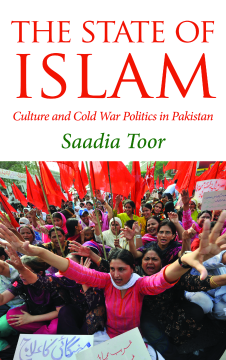
Additional Information
Book Details
Abstract
This book tells the story of Pakistan through the lens of the Cold War, and more recently the War on Terror, to shed light on the domestic and international processes behind the global rise of militant Islam.
Unlike existing scholarship on nationalism, Islam and the state in Pakistan, which tends to privilege events in a narrowly defined ‘political’ realm, Saadia Toor highlights the significance of cultural politics in Pakistan from its origins to the contemporary period. This extra dimension allows Toor to explain how the struggle between Marxists and liberal nationalists was influenced and eventually engulfed by the agenda of the religious right.
'A deeply informed study of Pakistan's unfinished journey, marked by the historical suppression of its vibrant Left. Read it, argue over it, and be part of the journey to renew Pakistan'
Vijay Prashad, author of the The Darker Nations, and co-editor of Dispatches from Pakistan
'Reveals a country that is nothing like the hotbed of Islamic extremism and military dictatorship we read about constantly.This book is a powerful antidote to reactionary stereotypes of Pakistan that dominate academic research and popular media'
David Ludden, Professor of History, New York University, author of India and South Asia: A Short History
Table of Contents
| Section Title | Page | Action | Price |
|---|---|---|---|
| Cover | Cover | ||
| Contents | vii | ||
| Acknowledgments | ix | ||
| 1. Introduction | 1 | ||
| Indian Muslims and the Politics of Representation | 7 | ||
| Muslim Nationalism in the Political Arena | 10 | ||
| A \"Maimed, Mutilated and Moth-Eaten Pakistan | 13 | ||
| Communism and Muslim Nationalism | 15 | ||
| 2. Consolidating the Nation-State: East Bengal and the Politics of National Culture | 18 | ||
| The Contradictions of Independence | 19 | ||
| The Trouble with East Bengal | 25 | ||
| Muslim\" Urdu Versus \"Hindu\" Bangla | 26 | ||
| The State of the Muslim League | 31 | ||
| Producing the Law-and-Order Society | 39 | ||
| One Unit\" and the Politics of Parity | 45 | ||
| 3. Post-Partition Literary Politics: The Progressives versus the Nationalists | 52 | ||
| The Progressive Writers Association | 53 | ||
| The New \"National Question | 55 | ||
| The Progressives Throw Down the Gauntlet | 58 | ||
| The Discourse of Loyalty | 63 | ||
| Literature, Partition and \"Nation-Building | 70 | ||
| The Iron Hand in the Velvet Glove | 75 | ||
| 4. Ayub Khan's Decade of Development and its Cultural Vicissitudes | 80 | ||
| The Rise of the \"Establishment Writer | 86 | ||
| Cold War Literary Trends | 89 | ||
| Managing Islam | 93 | ||
| The Anti-Ayub Movement | 96 | ||
| Anti-Communist Propaganda and the Attack on \"Islamic Socialism | 99 | ||
| The Nation of Islam | 106 | ||
| The Problematics of Pakistani Culture | 110 | ||
| 5. From Bhutto's Authoritarian Populism to Zia's Military Theocracy | 117 | ||
| Cozying Up to the Gulf States | 121 | ||
| Culture and Ideology Under Bhutto | 122 | ||
| A Right-Wing Movement and a Coup | 123 | ||
| Pakistan Ka Matlab Kya? Phaansi, Kore, General Zia! | 125 | ||
| Restoring the Status Quo Ante | 130 | ||
| The Nizam-I Mustafa | 131 | ||
| Challenges to the Regime | 137 | ||
| Culture and Ideology Under Zia | 149 | ||
| Islam and the Military | 153 | ||
| 6. The Long Shadow of Zia: Women, Minorities and the Nation-State | 159 | ||
| Women and/as Property | 162 | ||
| Erasing the non-Muslim \"Other | 178 | ||
| Epilogue: The Neoliberal Security State | 185 | ||
| Jithe Vekho Faujañ Ee Faujañ | 187 | ||
| The State of Progressive Politics | 192 | ||
| Notes | 203 | ||
| References | 234 | ||
| Index | 245 |
